Argos
| Argos Άργος |
|
|---|---|
A view of Argos showing the remains of the ancient theatre. |
|
 |
|
| Location | |
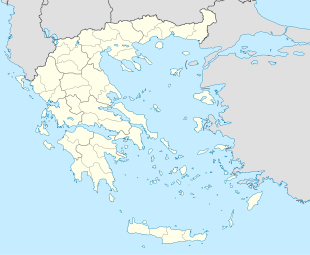 Argos
|
|
| Coordinates | |
|
Location within the prefecture
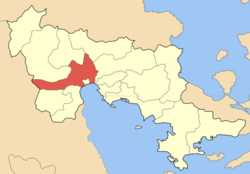 |
|
| Government | |
| Country: | Greece |
| Periphery: | Peloponnese |
| Prefecture: | Argolis |
| Mayor: | Vasilios Mpoures |
| Population statistics (as of 2001[1]) | |
| City | |
| - Population: | 24,239 |
| Municipality | |
| - Population: | 29,228 |
| - Area: | 138.138 km2 (53 sq mi) |
| - Density: | 212 /km2 (548 /sq mi) |
| Other | |
| Time zone: | EET/EEST (UTC+2/3) |
| Elevation (center): | 42 m (138 ft) |
| Postal: | 21200 |
| Telephone: | 2751 |
| Auto: | AP |
| Website | |
| www.argos.gr | |
Argos (Greek: Ἄργος, Árgos, [ˈaɾɣos]) is a city in Greece in the Peloponnese 11 kilometres from Nafplion, which was its historic harbour (named supposedly after the legendary hero Nauplius).
Contents |
Name
The region of Argos is known as the Argolis, Argolid, or Argeia. The inhabitants of Argos were known as Ἀργεῖοι or Argīvī in Latin, rendered Argives in English.
The name might be of pre-Greek ("Pelasgian") derivation; the name of its acropolis, Larissa, certainly is. Aitiology derives it from a mythological founder, Argos son of Zeus and Niobe (see also Danaus). If the name is Indo-European, it may be related to the adjective argós (αργóς, "shimmering" or "quick"), from a root arg- (PIE *arǵ-, hence also argyros, silver), with a meaning "shining brightly" or similar.
History
Ancient Argos
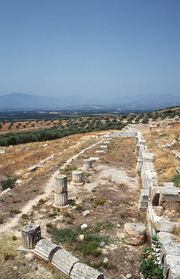
A Neolithic settlement was located near the central sanctuary of Argois, removed 45 stadia (8 km; 5 miles) from Argos, closer to Mycenae. The temple was dedicated to "Argivian Hera". The main festival of that temple was the Hekatombaia, one of the major festivals of Argos itself. Walter Burkert (Homo necans, p. 185) connected the festival to the myth of the slaying of Argus Panoptes by Hermes ("shimmering" or "quick"), and only secondarily associated with mythological Argus (or the toponym).
Argos was a major stronghold of Mycenaean times, and along with the neighbouring acropolis of Mycenae and Tiryns became a very early settlement because of its commanding positions in the midst of the fertile plain of Argolis.
During Homeric times it belonged to a follower of Agamemnon and gave its name to the surrounding district; the Argolid which the Romans knew as Argeia. The importance of Argos was eclipsed by nearby Sparta after the 6th century BC.
Because of its refusal to fight or send supplies in the Graeco-Persian Wars, Argos was shunned by most other city-states. Argos remained neutral or the ineffective ally of Athens during the 5th century BC struggles between Sparta and Athens.
The Mythological kings of Argos are (in order): Inachus, Phoroneus, Argus, Triopas, Agenor, Iasus, Crotopus, Pelasgus (aka Gelanor), Danaus, Lynceus, Abas, Proetus, Acrisius, Perseus, Megapénthês, Argeus, and Anaxagoras. An alternative version (supplied by Tatiānus[2]) of the original 17 consecutive kings of Argōs includes Apis, Argios, Kriasos, and Phorbas between Argus and Triopas, explaining the apparent unrelation of Triopas to Argus.
After the original 17 kings of Argos, there were three kings ruling Argos at the same time (see Anaxagoras), one descended from Bias, one from Melampus, and one from Anaxagoras. Melampus was succeeded by his son Mantius, then Oicles, and Amphiaraus, and his house of Melampus lasted down to the brothers Alcmaeon and Amphilochus.
Anaxagoras was succeeded by his son Alector, and then Iphis. Iphis left his kingdom to his nephew Sthenelus, the son of his brother Capaneus.
Bias was succeeded by his son Talaus, and then by his son Adrastus who, with Amphiaraus, commanded the disastrous Seven Against Thebes. Adrastus bequethed the kingdom to his son, Aegialeus, who was subsequently killed in the war of the Epigoni. Diomedes, grandson of Adrastus through his son-in-law Tydeus and daughter Deipyle, replaced Aegialeus and was King of Argos during the Trojan war. This house lasted longer than those of Anaxagoras and Melampus, and eventually the kingdom was reunited under its last member, Cyanippus, son of Aegialeus, soon after the exile of Diomedes.
Argos played a role in the Peloponnesian war and beyond.
Medieval Argos
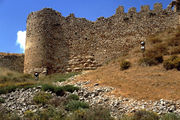
During the 12th century, a castle was built on Larissa Hill - the site of the ancient Acropolis - called Kastro Larissa. Argos was captured by the Crusaders, then the Venetians, and was taken by the Ottomans in 1463. Francesco Morosini captured it for Venice in 1686 but it was retaken by the Ottomans in 1715.
At the beginning of the Greek War of Independence, when many petty local republics were formed in different parts of the country, the "Consulate of Argos" was proclaimed on 26 May 1821, under the Senate of the Peloponnese. It had a single head of state, styled Consul, 28 March 1821 - 26 May 1821: Stamatellos Antonopoulos.
Later, Argos accepted the authority of the unified Provisional Government at the First National Assembly at Epidaurus, and eventually became part of the Kingdom of Greece.
Modern Argos
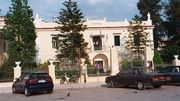
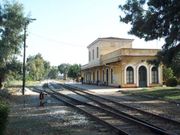
The city of Argos is the seat of the province of the same name, one of the three subdivisions of the Argolis prefecture. According to the 2001 Greek census, the city has a population of 27,550. It is the largest city in the prefecture, one of the few prefectures in Greece where the largest city in population is larger than the prefectural capital.
Considerable remains of the city survive and are a popular tourist attraction. Agriculture, however, is the primary economic activity in the area, with citrus fruits the predominant crop. Olives are also popular here.
Argos has a railway station on the Kalamata - Tripoli - Corinth line of the Hellenic Railways Organisation, and a junior soccer team. The Archaeological Museum of Argos houses ancient artifacts recovered not only from the principal archaeological sites of the city, including the theater and agora but also from Lerna. [1]
Greek mythology on film
In the film Clash of the Titans, Zeus orders the city of Argos destroyed after Acrisius arranges for his own daughter Danae and her son Perseus, who is also the natural son of Zeus, to be cast into the sea in a wooden chest to drown. Hades releases a sea monster known as the Kraken, which causes a tidal wave to devastate the city and kill Acrisius. Danae and Perseus survive and end up on Seriphos.
Notable people
- Acrisius, mythological king
- Acusilaus (6th century BC), logographer and mythographer
- Ageladas (6th-5th century BC), sculptor
- Pheidon (7th century BC), king of Argos
- Polykleitos (5th-4th century BC), sculptor
- Polykleitos the Younger (4th century BC), sculptor
- Telesilla (6th century BC), Greek poet
- Eleni Bakopanos (1954-), Canadian politician
International relations
Twin towns — sister cities
Argos is twinned with:
See also
- Kings of Argos
- Communities of Argolis
- Communities of Argos
- Argos (dog) Mythology: Dog of Odysseus
References
Notes
- ↑ "Δείτε τη Διοικητική Διαίρεση" (in Greek). Hellenic Interior Ministry. www.ypes.gr. http://www.ypes.gr/UserFiles/f0ff9297-f516-40ff-a70e-eca84e2ec9b9/D_diairesi.xls. Retrieved 2009-09-09.
- ↑ James Cowles Prichard : An Analysis of the Egyptian Mythology. 1819. p. 85
External links
- Official site
- The Theatre at Argos, The Ancient Theatre Archive, Theatre specifications and virtual reality tour of theatre
|
||||||||